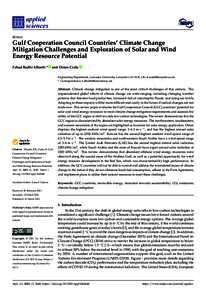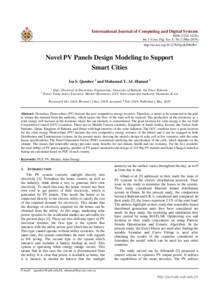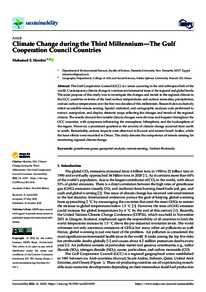وثيقة
Gulf cooperation council countries’ climate change mitigation challenges and exploration of solar and wind energy resource potential.
المعرف
DOI: 10.3390/app11062648
المصدر
Applied Sciences (Switzerland). v. 11, 6, 2648
المساهمون
Csala, Denes., مؤلف
الدولة
Switzerland
مكان النشر
Basel
الناشر
MDPI AG.
ميلادي
2021-03-02
اللغة
الأنجليزية
الموضوع
الملخص الإنجليزي
Climate change mitigation is one of the most critical challenges of this century. The un-precedented global effects of climate change are wide‐ranging, including changing weather patterns that threaten food production, increased risk of catastrophic floods, and rising sea levels. Adapting to these impacts will be more difficult and costly in the future if radical changes are not made now. This review paper evaluates the Gulf Cooperation Council (GCC) countries’ potential for solar and wind energy resources to meet climate change mitigation requirements and assesses the ability of the GCC region to shift towards low‐carbon technologies. The review demonstrates that the GCC region is characterized by abundant solar energy resources. The northwestern, southeastern, and western mountains of the region are highlighted as locations for solar energy application. Oman displays the highest onshore wind speed range, 3–6.3 m s⁻1, and has the highest annual solar radiation of up to 2500 kWh/m2. Kuwait has the second highest onshore wind speed range, 4.5–5.5 m s⁻1, particularly in the western mountains, while northwestern Saudi Arabia has a range of 3–6 m s⁻1. The United Arab Emirates (UAE) has the second highest annual solar radiation, 2285 kWh/m2, while Saudi Arabia and the state of Kuwait have equal annual solar radiation at 2200 kWh/m2. This review demonstrates that abundant offshore wind energy resources were observed along the coastal areas of the Arabian Gulf, as well as a potential opportunity for wind energy resource development in the Red Sea, which was characterized by high performance. In addition, the GCC countries will not be able to control and address the interrelated issues of climate change in the future if they do not eliminate fossil fuel consumption, adhere to the Paris Agreement, and implement plans to utilize their natural resources to meet these challenges.
ISSN
2076-3417
URL المصدر
قالب العنصر
مقالات الدوريات



